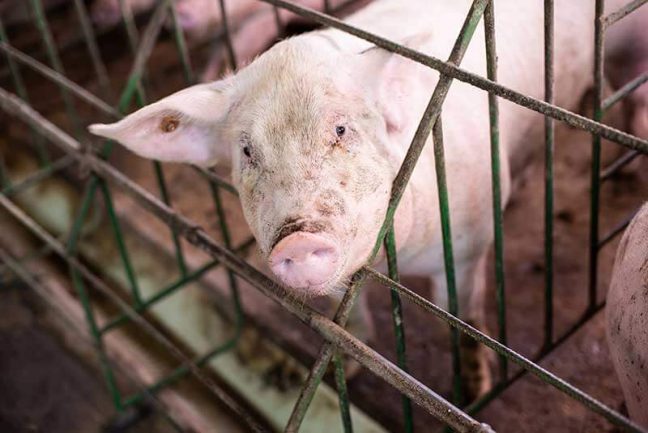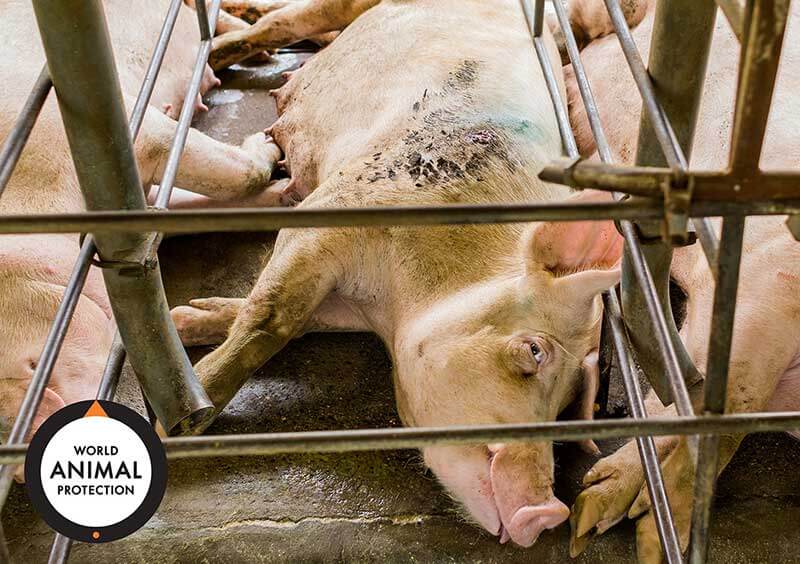On Nov. 25, World Animal Protection, a global animal welfare organization with offices in 14 countries, released US pork and the superbug crisis: how higher welfare farming is better for pigs and people. The new report reveals that bacteria resistant to antibiotics considered highly important or critically important to human health were present in pork products purchased at Walmart stores in the eastern U.S.
Antibiotic-resistant bacteria, also known as “superbugs,” pose a threat to all human life. The spread of antibiotic-resistant bacteria is a public health crisis affecting more and more people each day. The Centers for Disease Control and Prevention (CDC) now estimates that more than 2.8 million antibiotic-resistant infections occur in the United States each year, and more than 35,000 people die as a result. Superbugs are emerging on farms from antibiotic overuse and entering our food chain and environment. When antibiotic-resistant superbugs are passed to people, they make us less able to fight disease.
“The presence of multidrug-resistant bacteria on pork products illustrates the role the pork supply chain plays in the global health crisis caused by antibiotic-resistant bacteria,” said Alesia Soltanpanah, executive director of World Animal Protection, U.S. “The fact that pork purchased from several Walmart stores, one of the nation’s largest retailers, contains bacteria resistant to antibiotics critically important to human health is particularly alarming and should raise concerns for all Walmart customers.”
One of the biggest factors behind the growing problem of antibiotic resistance is that antibiotics are vastly overused in raising farmed animals. Globally, most antibiotics are used in animal farming. While use of the drugs as growth promoters in feed and water is no longer permitted in the United States, antibiotics are still used on a routine basis to stop the spread of disease, particularly in low-welfare, factory farm systems where animals are confined in overcrowded and barren environments. Approximately 70 percent of all medically important antibiotics in the United States are sold for use in farmed animals.
World Animal Protection says the stressful and cruel conditions on factory farms created by pork producers are the perfect breeding ground for infection. The organization also says that instead of creating a better environment for pigs, producers are overusing antibiotics to stop stressed or injured animals getting sick, contributing to the rise of superbugs.
World Animal Protection tested a total of 160 pork samples purchased from several stores of Walmart and a competing national retail chain in the mid-Atlantic region of the United States. The samples, 80 from each retailer, were analyzed by researchers at Texas Tech University (TTU) in 32 batches of five samples each for the presence of bacteria commonly found in pigs and pork: E.coli, Salmonella, Enterococcus and Listeria. Bacteria isolated from the batches were then tested for susceptibility to antibiotics.
Eighty percent of the bacteria isolated from Walmart’s pork products were resistant to at least one antibiotic, including resistance to classes of antibiotics considered highly important or critically important by the World Health Organization. Furthermore, all of the bacteria resistant to four or more classes of antibiotics that World Animal Protection found and all bacteria resistant to Highest Priority Critically Important Antimicrobials (HPCIAs) were found in Walmart’s samples. HPCIAs are antibiotics where there are few or no alternatives to treat people with serious infections—the Food and Agriculture Organization of the United Nations recommends that these classes should never be used in animal agriculture.
 In total, across Walmart’s 15 batches there were 32 positive bacterial findings, including:
In total, across Walmart’s 15 batches there were 32 positive bacterial findings, including:
- Enterococcus in 13 batches;
- E.coli in 10 batches;
- Salmonella in six batches, and;
- Listeria in three batches.
All batches that tested positive for three or more bacteria were sold at Walmart.
While Walmart has not yet made a time-bound commitment to phase out sow stalls in its supply chain, several of its competitors have. Target and Costco have committed to only partner with suppliers who do not use gestation crates by 2022 and Kroger by 2025.
“By requiring higher welfare practices of all its pork suppliers, starting with a definitive timeline to end the use of gestation crates, Walmart can help eliminate the overuse of antibiotics to protect pigs and their customers,” said Soltanpanah. “In fact, 88 percent of Walmart customers surveyed agreed that supermarkets have a responsibility to ensure that pigs are treated well, and 78 percent would be more inclined to shop at a retailer that planned to eliminate cages from its pork supply.”
World Animal Protection says the results of these tests have implications for all retailers, as well as pig producers and consumers of pork. The organization is calling for global supermarkets to improve the lives of pigs by only sourcing pork from high-welfare farms. World Animal Protection’s Raise Pigs Right campaign is calling for pigs to be spared painful mutilations, freed from cages and not left to suffer in barren environments that promote disease. It says, rather, these animals should be allowed to live in groups, with room to move, and given opportunities to express their natural behaviors.

